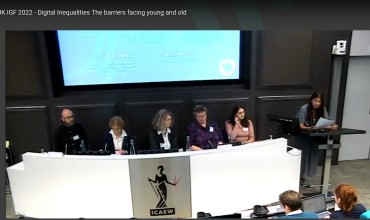Meaningful access
 "We talk as if being online is a choice," Sonia Livingstone commented on , "but we live in a context and all the decisions around us matter."
"We talk as if being online is a choice," Sonia Livingstone commented on , "but we live in a context and all the decisions around us matter."
As we've observed before, it's only for the most privileged that *not* being online or *not* carrying a smartphone comes without cost.
Livingstone was speaking on a panel on digital inequalities at this week's UK IGF, an annual forum that mulls UK concerns over Internet governance in order to feed them into the larger global conversation on such matters (IGF). The panel highlighted two groups most vulnerable to digital exclusion: old people and children.
According to Ofcom's 2022 Online Nations report, in 2021 6% of British over-18s did not have Internet access at home. That average is, however, heavily skewed by over-65s, 20% of whom don't have Internet access at home and another 7% of whom have Internet access at home but don't use it. In the other age groups, the percentage without home access starts at 1% for 18-24 and rises to 3% for 44-54. The gap across ages is startlingly larger than the gap across economic groups, although obviously there's overlap: Age UK estimated in 2021 that 2 million pensioners were living in poverty.
I know one of the people in that 20%. She is adamant that there is nothing the Internet has to offer that she could possibly want. (I feel this way about cryptocurrencies.) Because, fortunately, the social groups she's involved in are kind, tolerant, and small, the impact of this refusal probably falls more on them than on her: they have to make the phone calls and send the printed-out newsletters to ensure she's kept in the loop. And they do.
Another friend, whose acquaintance with the workings of his computer is so nodding that he gets his son round to delete some files when his hard drive fills up, would happily do without it - except that his failing mobility means that he finds entertainment by playing online poker. To him, the computer is a necessary, but despised, evil. In Ofcom's figures, he'd look all right - Internet access at home, uses it near-daily. But the reality is that despite his undeniable intelligence he's barely capable of doing much beyond reading his email and loading the poker site. Worse, he has no interest in learning anything more; he just hates all of it. Is that what we mean by "Internet access"?
These two are what people generally think of when they talk about the "digital divide".
As Sally West, policy manager for Age UK, noted, if you're not online it's becoming increasingly difficult to do mundane things like book a GP appointment or do any kind of banking. Worse, isolation during the pandemic led some to stop using the Internet because they didn't have their customary family support. In its report on older people and the Internet, Age UK found that about half a million over-65s have stopped using the Internet. And, West said, unlike riding a bike, Internet skills don't necessarily stay with you when you stop using them. Even if they do, they lose relevance as the technology changes.
For children, lack of access translates into educational disadvantage and severely constricted life opportunities. Despite the government's distribution of laptops. Nominet's Digital Youth Index finds that a quarter of young people lack access to one, and 16% rely primarily on mobile data. And, said Jess Barrett, children lack understanding of privacy and security yet are often expected to be their family's digital expert.
More significantly, the Ofcom report finds that 20% of people - and a *third* of people aged 25-34 - used only a smartphone to go online 2021. That's *double* the number in 2020. Ofcom suggests that staying home much of 2020 and newer smartphones' larger screens may be relevant factors. I'd guess that economic uncertainty played an important role and that 2022's cost-of-living crisis will cause these numbers to rise again. There's also a generational aspect; today's 30-year-olds got their teenaged independence via smart phones.
To Old Net Curmudgeons, phone-only access isn't really *Internet* access; it's walled-garden apps. Where the open Internet promised that all of us could build and distribute things, apps limit us to consuming what the apps' developers allow. This is not petty snobbery; creating the next generation of technology pioneers requires learning as active users instead of lurkers.
This disenfranchisement led Lizzie Coles-Kemp to an approach that's rarely discussed: "We need to think how to design services for limited access, and we need to think what access means. It's not binary." This approach is essential as the of the mobile phone world's values risk overwhelming those of the open Internet.
In response, Livingstone mooted the idea of "meaningful access": the right device for the context and sufficient skills and knowledge that you can do what you need to.
The growing cost-of-living crisis, exacerbated this week by an interest rate rise, makes it easy to predict a marked further rise in households that jettison fixed-line broadband. This year may be the first since the Internet began in which online access in the UK shrinks.
"We are just highlighting two groups," Livingstone concluded. "But the big problem is poverty and exclusion. Solve those, and it fixes it."
Illustrations: UK IGF's panel on digital inequalities: Cliff Manning, Sally West, Sonia Livingstone, Lizzie Coles-Kemp, Jess Barrett,
Wendy M. Grossman is the 2013 winner of the Enigma Award. Her Web site has an extensive archive of her books, articles, and music, and an archive of earlier columns in this series. Stories about the border wars between cyberspace and real life are posted occasionally during the week on Twitter or @wendyg@mastodon.xyz.